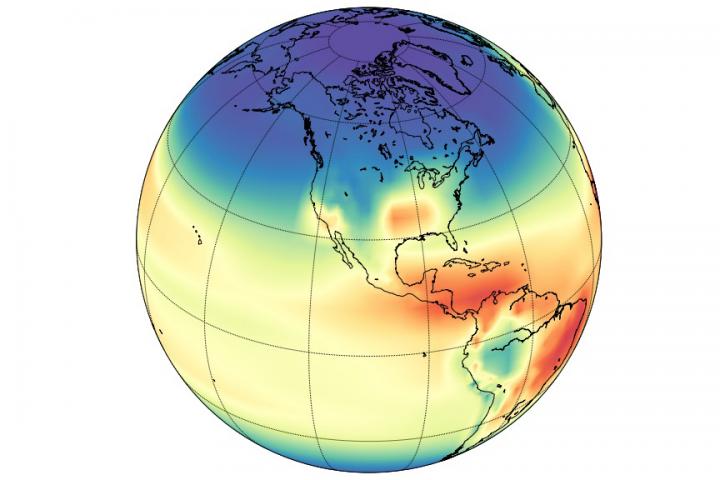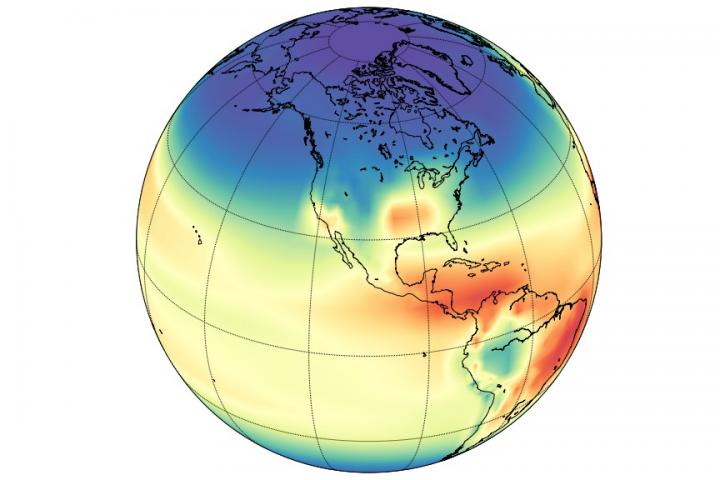
Credit: Angharad Stell, University of Bristol.
Recent studies have explored a range of possible causes. Suggestions have included a rise in oil and natural gas extraction, increased emissions from tropical wetlands or increases in emissions from growing East Asian economies.
However, a new paper by an international team of scientists in the Proceedings of the National Academy of Sciences (PNAS) investigates an alternative possibility: a rise and fall in the concentration of the substance that destroys methane in the atmosphere, the hydroxyl radical.
Lead author, Dr Matt Rigby from the University of Bristol's School of Chemistry and Cabot Institute, said: "A change in the hydroxyl radical concentration would be a neat explanation for the changes in methane that we've seen.
"It would mean that emissions may not have increased suddenly in 2007, but rather, risen more gradually over the last couple of decades."
Since the global concentration of the hydroxyl radical cannot be measured directly, the team's findings were made by studying the rate at which the solvent methyl chloroform, which is also destroyed by hydroxyl, was removed from the atmosphere.
Professor Ron Prinn from the Massachusetts Institute of Technology, who co-authored the paper and leads the Advanced Global Atmospheric Gases Experiment (AGAGE), an international project that measures greenhouse gas concentrations, said: "We have been monitoring trends in the methyl chloroform for nearly 40 years because of its role in depleting stratospheric ozone.
"Because methyl chloroform is now banned under the Montreal Protocol for the Protection of the Stratospheric Ozone Layer, we've see its concentration drop very rapidly.
"We can examine how this rate of decline changes from one year to the next to infer the hydroxyl radical concentration."
Dr Steve Montzka from the National Oceanic and Atmospheric Administration (NOAA), who also co-authored the paper, and operates an independent measurement network for methylchloroform, added: "This paper re-examines some of the assumptions that had previously been made in studies of hydroxyl radical and methyl chloroform and shows how they influence our understanding of methane's atmospheric sink.
"To me, one of the main findings is that our objective analyses of two sets of observations tells essentially the same story, even as it becomes more and more difficult to measure methyl chloroform given that its concentration is approaching zero."
Dr Rigby added that there was still uncertainty remaining. He explained: "Whilst there are strong hints in our study that hydroxyl radical changes could be playing a significant role in the fluctuations in methane growth, our uncertainties are very large.
"In future, we need to think about new ways to reduce this uncertainty, if we are to truly understand changes in atmospheric methane."
The study also lead to a more certain, but unexpected finding: that emissions of methyl chloroform had not dropped to zero.
Dr Rigby said: "Because its production is now banned globally, we were expecting to see no emissions of this substance at all. However, we have very strong evidence that emissions are continuing."
The team are preparing a follow-up study that would determine where these emissions are originating. Meanwhile, they are continuing to monitor methane in the atmosphere, and are waiting to see whether its current rate of increase will continue.
###
Media Contact
Matt Rigby
[email protected]
07-905-670-549
@BristolUni
http://www.bristol.ac.uk
############
Story Source: Materials provided by Scienmag





